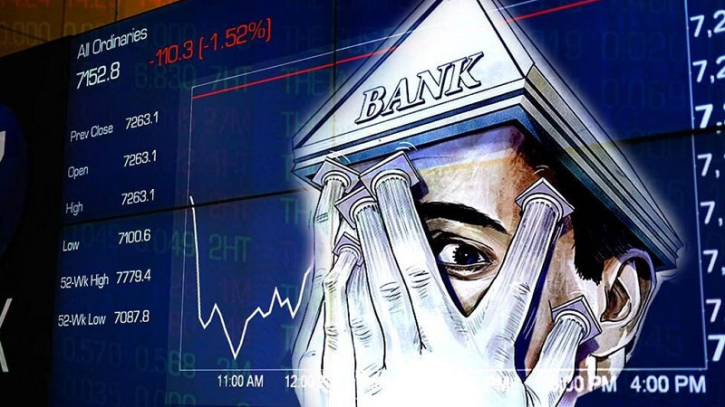Global banking crisis and Bangladesh's safety net

There’s no denying the fact that digital currencies are going from bad to worse across the globe. The cryptocurrency market is in great turmoil. The new generation of investors—Crypto and Robinhood and the industry leaders are deeply apprehensive of a crisis they call ‘crypto winter’, which means share prices have plummeted to an all-time low. After the digital currency market has proved vulnerable to the global economy, myriad problems have plagued the leading crypto-focused banks like Silvergate Bank, Silicon Valley Bank and Signature Bank in the US and Credit Suisse Bank in Switzerland. Besides, it’s news to us all that more 186 banks in the US are going to be put at risk.
However, it is reassuring to know that while the world is grappling with the cryptocurrency crisis, Bangladesh remains relatively unaffected. Unlike many other countries, Bangladesh has not yet embraced this decentralized financial network based on blockchain technology called cryptocurrency as a legitimate form of currency, nor has our central bank invested in the newfangled stuff called digital assets like Bitcoin which exists outside the control of governments and central authorities. As a result, Bangladesh has emerged as a safe haven and shielded from the impact of the global economic upheaval that has affected other parts of the world. However, with the ongoing global banking crisis regarding cheaper and faster money transfers and decentralized systems, Bangladesh may, in the future, be faced with challenges in maintaining its financial stability. And hence we have to explore ways and means as to how Bangladesh can remain resilient against the cryptocurrency crisis and survive the global banking turmoil.
One of the good reasons why Bangladesh is safe from the cryptocurrency crisis is that the central bank of Bangladesh, due to its conservative banking policies, has not invested in this new asset class. Nor has it allowed other banks in Bangladesh to invest in digital currencies like Bitcoin. The main reason for the ongoing financial disaster in the American and other banks is their huge investment in cryptocurrency. But Bangladesh Bank has long been cautious in its approach to digital currencies and has ensured that financial institutions maintain adequate capital buffers and avoid excessive risk-taking. Though the US central bank has increased interest rates on a large scale to curb inflation, Bangladeshi bank has not done so. It has increased the interest rate a little bit which makes an impact on the fund management expenditure of the banks, but does not have an adverse effect on inflation. While the US banks made big investment in small sectors like startup and housebuilding, investments of Bangladeshi banks were not accumulated in any particular sector(s). Besides the Bangladeshi share market is not that much associated with the global share market and hence the global financial crisis takes no or little toll on Bangladesh’s economy. Moreover, a large portion of Bangladesh’s informal economy that contributes a great deal to our GDP is not within the purview of the banking sector and hence remains unaffected by external threats and gets stronger. In addition, since the major US banks are still stable, the financial transactions between them and Bangladesh RMG sectors are stable. Above all, Bangladesh’s banking systems and the economic sectors dependent on it are less prone to the adverse effects of global financial disasters like the crypto crisis. So, the enlisted 61 banks in Bangladesh still feel safe in the knowledge that they are furthest removed from crypto’s uncertainties.
That Bangladesh Bank does not invest in cryptocurrency means that the country is not exposed to the vagaries of ongoing global banking crisis and the risks involved with cryptocurrency investments, such as volatility and uncertainty. As a result, Bangladesh is in a more advantageous position intending to weather the storm of the cryptocurrency crisis compared to other countries that have invested heavily in this market.
Though Bangladesh may not be directly affected by the cryptocurrency turmoil, it is not fully immune to the wider financial problems that are affecting the global economy. Bangladesh Bank expresses concern over the lack of regulatory oversight, the factors in fraud and money laundering, and the volatility of the market. And consequently, it has refrained from investing in cryptocurrencies, to make sure that its nascent economy is not exposed to the risks of the global market. In order to survive the challenges that might crop up, the government is expected to adopt a number of financial policies to ensure the country's continued stability and progress. First comes strengthening regulatory framework. The government can reinforce the regulatory framework for digital assets to prevent their proliferation in the country. This can include measures like banning cryptocurrency exchanges, imposing strict ‘Know Your Customer’ (KYC) regulations, and introducing tough new anti-money laundering laws. Second comes promoting alternative investment options. The government should promote alternative forms of investment such as mutual funds, government bonds, and stocks to diversify the investment portfolio of the country. This may help reduce the dependence on cryptocurrencies and other risky virtual assets. The third policy is to increase financial literacy. The government should encourage financial literacy and education to ensure that people are aware of the risks and benefits of various investment options. This can help individuals to make informed decisions and avoid investing in the deceptively attractive and risky financial markets/dividend stocks being motivated by enchanting brokerage apps. The fourth is to develop a resilient banking sector. The government can ensure that the banking sector maintains adequate capital buffers and avoids excessive risk-taking. This can help build a resilient banking sector that can cushion the blow of economic shocks. Collaboration with international organizations such as the International Monetary Fund (IMF) and the World Bank can be the government’s economic strategy to ensure that Bangladesh is prepared to handle any financial crises that may arise. Another important policy that the Bangladesh government can take is to encourage the growth of small and medium-sized businesses which are the backbone of our economy, and can be achieved by offering tax advantages. On top, to escape the clutches of crypto crisis, the government can take effective steps to continue to invest in its own economy, i.e. infrastructure, education, and other areas that can help to create jobs and stimulate economic growth. By doing so, the country can ensure that it remains competitive in the global market and can manage to survive any economic crises that may come its way.
However, we should not be overjoyed at the fact that Bangladesh’s cautious approach to digital currencies has placed the nation in a safe haven amidst the ongoing crisis. We have no time to bask in our country’s reflected glory. By continuing to adopt prudent financial policies and implement them, we should make sure that Bangladesh remains immune, as far as possible, to the volatility and risks of the ongoing global banking crisis.
Source: Daily Sun
.png)




